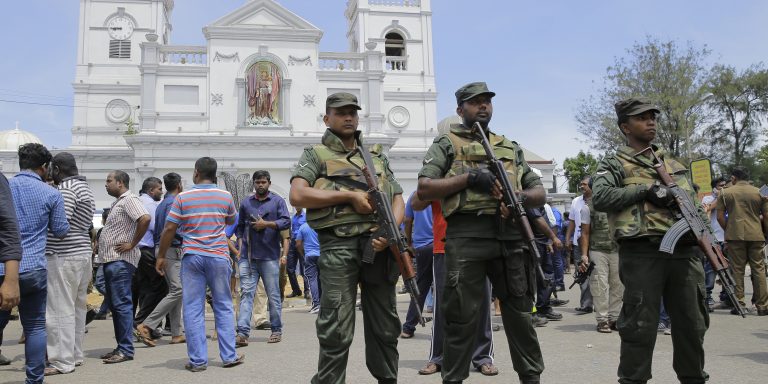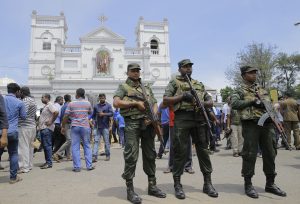INTELBRIEF
April 22, 2019
IntelBrief: An Easter Massacre in Sri Lanka

- On Easter Sunday, coordinated suicide attacks shook Sri Lanka, leaving more than 200 people dead and injuring several hundred more.
- Eight separate attacks targeted Christians celebrating Easter Sunday, the culmination of the holiest week in the Christian calendar, as well as hotels frequented by Westerns.
- To prevent the spread of disinformation, Sri Lankan authorities temporarily blocked popular social media sites and apps, including WhatsApp and Facebook.
- So far, no group has claimed responsibility for the attack. Some have speculated that the attack bears hallmarks to previous attacks perpetrated by Salafi-jihadist groups.
.
On Easter Sunday, coordinated suicide attacks shook Sri Lanka, leaving more than 200 people dead and injuring several hundred more. Eight separate attacks targeted Christians celebrating the culmination of the holiest week in the Christian calendar, as well as hotels frequented by Westerns. More than two dozen of the dead were foreigners, with casualties reported including individuals from the United Kingdom, the United States, China, the Netherlands, and Portugal. The attacks occurred at several churches across the country, including in the capital, Colombo, as well as in Negombo and Batticaloa, as well as posh hotels in Colombo, such as the Shangri-La, the Cinnamon Grand, and the Kingsbury. In response, the government imposed a curfew and began conducting raids to collect intelligence and search for the militants responsible for the attack, which so far, has not been claimed, although authorities have reportedly detained at least thirteen suspects. A police official allegedly alerted security authorities ten days ago about a potential threat posed by a local extremist group, National Thoweeth Jama’ath, although that group has so far not been identified as the culprit behind Sunday’s attack.
Even with no claim of responsibility for the attack, some have observed that the attack bears hallmarks to attacks by other Salafi-jihadist groups, particularly those where local groups receive foreign support, as occurred with the 2000 Christmas Eve bombings in Indonesia, where al-Qaeda coordinated with Jemmah Islamiyah. There are also clear similarities to the 2005 Amman hotel bombings, conducted simultaneously and masterminded by al-Qaeda in Iraq leader Abu Musab al-Zarqawi. These attacks are designed to increase sectarian tensions and destabilize the governments of the countries where they take place. Sri Lanka is an incredibly diverse country ethnically and religiously and was engulfed in three decades of war—the Liberation Tigers of Tamil Eelam (LTTE), or Tamil Tigers, waged a separatist insurgency against the Sinhalese Buddhist government between the late 1970s and 2009. Some terrorism scholars have noted that it is unlikely that remnants of the LTTE or other Tamil groups were responsible, given that these groups were ethno-nationalist in nature and the primary adversary of the Tigers were Sinhalese Buddhists, not Christians. Terrorist groups frequently target what they perceive to be soft targets, especially hotels frequented by Westerners, as witnessed in similar incidents in Pakistan, Indonesia, and throughout West Africa.
To prevent the spread of disinformation, Sri Lankan authorities blocked popular social media sites and apps, including WhatsApp and Facebook. Other websites and apps that were blocked included Instagram, Viber, YouTube, and Snapchat. Economy Minister Harsha de Silva announced that the social media ban would be temporary, although it would remain in place until authorities could stabilize the situation in the immediate aftermath of the attacks. In the past, Sri Lanka has struggled to contain the viral nature of misinformation, which in some cases has led to protests, looting, and violent riots, often with a sectarian or religious element to them. While social media does play a role in spreading misinformation, it can also be used to help coordinate relief activities and alert emergency responders to people or areas in desperate need of assistance.
The Easter attacks in Sri Lanka are also reminiscent of other attacks targeting Christians on Easter Sunday. In 2016, Jamaat-ul-Ahrar, a splinter group of Tehrik-i-Taliban Pakistan (TTP), or the Pakistani Taliban, conducted a suicide attack in Lahore that killed 75 people and injured nearly 350 more. Similarly, twin suicide bombings in 2017 on Palm Sunday perpetrated by the Islamic State’s affiliate in the Sinai killed a total of nearly 50 worshipers in Tanta and Alexandria, respectively. If these attacks are ultimately linked to IS, it would be yet another locale where the group has sought to expand its reach in the wake of the collapse of the territorial caliphate. IS has made recent inroads in the Democratic Republic of the Congo and redoubled efforts to gain a foothold in Yemen. The combination of a rise in identity politics and the funding of extremist groups throughout South Asia by Saudi Arabia has contributed to a rising tide of radicalization within the region. An estimated 32 Sri Lankans were known to have joined the Islamic State fighting in Iraq and Syria. As a January 2019 report by The Soufan Center highlighted, Salafi-jihadist groups, including both IS and al-Qaeda, have long viewed South Asia as fertile ground to gain new territory and recruits, and militant propaganda has highlighted injustices against Muslims in Bangladesh, Myanmar, India, and Sri Lanka.
.
Update: In our IntelBrief from 22 April 2019, an earlier version used the sentence "as well as tourists staying in Western hotels." This was updated to say "as well as hotels frequented by Westerners."
.
For tailored research and analysis, please contact: info@thesoufancenter.org
[video width="960" height="540" mp4="https://thesoufancenter.org/wp-content/uploads/2019/04/IB-0422-1.mp4" poster="https://thesoufancenter.org/wp-content/uploads/2019/04/AP_19111218997665.jpg"][/video]
